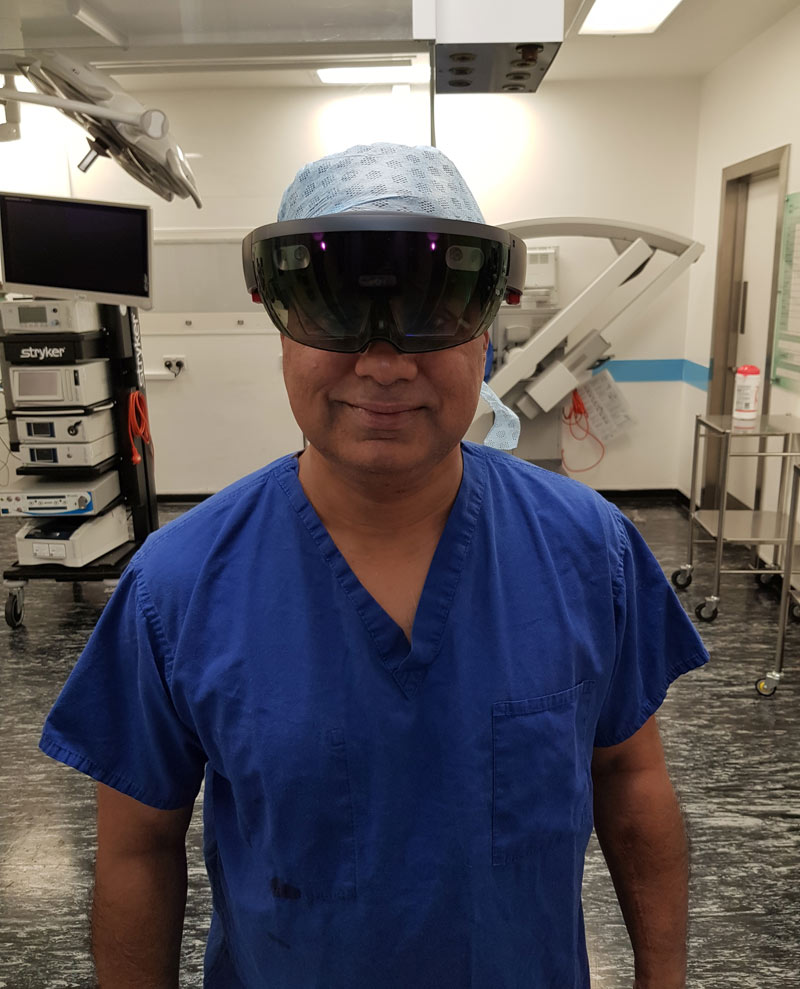Surgeons use virtual reality to operate from different sides of the world

Professor Shafi Ahmed used Microsoft's Hololens to virtually bring together surgeons from across the world to operate together on a patient at The Royal London Hospital.
For the first time, three surgeons from Mumbai and London simultaneously wore Hololens headsets to appear live in the same hospital operating theatre where Professor Shafi Ahmed was operating to remove bowel cancer. They could 'see' each other moving as graphic avatars, standing and speaking as if together in the room.
Professor Ahmed was joined by Professor Shailesh Shrikhande, cancer surgeon at Tata Memorial Hospital in Mumbai and the largest cancer hospital in India, and Mr Hitesh Patel, consultant colorectal surgeon at BMI The London Independent Hospital.
Thrive applied in medicine. from Aetho on Vimeo.
Each specialist was able to point to pre-uploaded patient scans appearing as 3D holograms of the tumour hovering in the theatre, virtually drawing on the images to aid discussion all while the patient was on the operating table.
Professor Shafi Ahmed, colorectal surgeon at Barts Health NHS Trust, said: "We have truly integrated technology with healthcare. By bringing together specialists in real time from across the world and different time zones we have demonstrated that we can make surgery safer and ensure the best patient outcomes, democratising surgical practice."
Currently, medical and nursing specialists at hospitals meet regularly in a multidisciplinary team meeting to ensure a range of skills are involved when discussing the care of complex patient cases, referring to patient scans on PowerPoint presentations. However, it is limited to the insight of those at the hospital able to attend the meeting, and with emergency surgery there may not be time to discuss the complexities. When it comes to the operation, the surgeons are often on their own.
"Augmented and Virtual Reality have incredible potential, not only in the NHS but also to encourage collaboration to improve accessibility, equity and safety in developing countries", explained Professor Ahmed.
Professor Shailesh Shrikande said: "I am delighted that Tata Memorial Centre in Mumbai, one of the largest premier cancer centres of the world, has taken the lead yet again to meet the challenges of modern day surgical training in this part of the world. The platform is simply amazing but it would be even more fascinating a journey to see how this platform evolves to transform patient care across a vast country like India, revolutionising surgical training in a nation that thrives in different centuries at the same time."
Mr Hitesh Patel, colorectal surgeon at BMI The London Independent Hospital added: “This was the first time I’ve used the HoloLens and I found it very exciting. It takes a while to get used to but it was clear to see the other people involved as a hologram. It was an amazing way to interact with eminent surgeons across the world, and discuss the case and look at the same images together. It’s also nice to have everything in front of you without sifting through paper, trying to find results – so all of these are great benefits to the patient.”
Dubbed 'the virtual surgeon', Professor Shafi Ahmed has pioneered the use of technology during surgery. In 2014 he used google glasses to aid the learning of surgical students by transporting 13,000 people from 115 countries directly into the operating theatre, and more recently ventured into Virtual Reality using Google Cardboard and Snapchat Spectacles. Using Microsoft Hololens, he demonstrates for the first time how technology can also directly improve safety and outcomes for patients.
The project was coordinated by the three hospitals, VR company Medical Realities and Aetho who provided the “Thrive” software.
